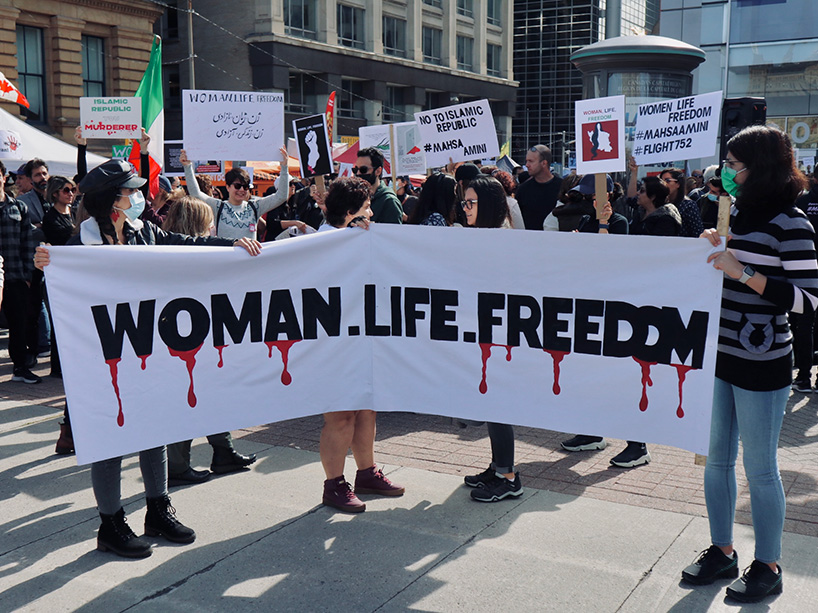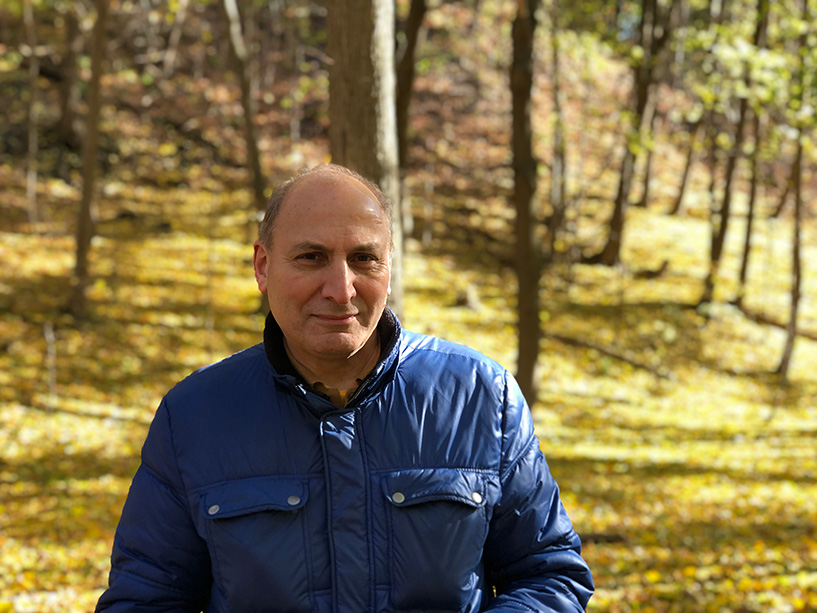A new kind of revolt: Understanding the women-led protests in Iran

Protests in solidarity with Mahsa Amini in Ottawa, September, 2022. Photo: Taymaz Valley via WikiMedia Commons
Women. Life. Freedom.
Young Iranians today want to bring happiness back to public life—a sentiment that has organized itself around the Iranian protestors’ powerful slogan, heard around the world, says esteemed Iranian scholar Ramin Jahanbegloo.
Jahanbegloo was the guest speaker at the most recent International Issues Discussion (external link) (IID) series talk at Toronto Metropolitan University, organized by Professor Arne Kislenko, which took as its theme “Understanding Protests in Iran.”
Protests have erupted across Iran since mid September after the death of 22-year old Mahsa Amini who had been detained by the Islamic Republic’s morality police for not wearing the hijab in accordance with government standards. The protests have also called for the fall of Supreme Leader Ayatollah Ali Khamenei. In response, Iranian authorities have intensified their deadly crackdowns against young people, women, and even children (external link) .
Sharing his views with guests who joined both the in-person and virtual lecture, Jahanbegloo, a political philosopher, executive director of the Mahatma Gandhi Centre for Nonviolence and Peace Studies and vice-dean of the School of Law at Jindal Global University in Delhi, India, unpacked the motivations of a new generation of Iranians hungry for change, beginning with the protest’s slogan.
“In ‘women, life, freedom’ we see an emphasis on the free individuality of women,” says Jahanbegloo. He explains that Iranian youth also want the possibility of a future, and the ability to dream that future. Finally, the call for freedom is in fact a call for negative liberties or freedoms from various forms of repressions they currently face.
“The protests are very much a demonstration against restraints as women, as young people, restraints within the family, restraints in universities and public life, as well as the world,” he says.

Political philosopher and executive director of the Mahatma Gandhi Centre for Nonviolence and Peace Studies, Ramin Jahanbegloo, shares his views about the ongoing women-led protests in Iran.
Iran’s triple crisis
Jahanbegloo believes the Iranian regime today is suffering a triple crisis; socio-economic, political and generational. This combination, he asserts, distinguishes these protests from previous ones.
The ruling elites have mismanaged public funds and only enriched themselves, says Jahanbegloo. And politically, the regime is facing a serious legitimacy crisis in its inability to meet the needs of young Iranians, cut off and out of touch with its populace for a long time.
The situation is especially intolerable for young Iranians who are rejecting rigid Islamic orthodoxy and the fanaticism that leads to women being killed for moral impropriety.
“The growing sense of popular disillusionment and frustration that has forcibly erupted since the student upheaval of 1999, shows clearly that the Islam of Iran has failed to deliver on all its promises,” says Jahanbegloo. “For the past 44 years, it has functioned as a criminal, corrupt and cruel regime.”
A revolution of values
The new generation of Iranian youth has come of age with the influences of social media. “A new mentality was shaped, a new way of living and a new sense of belonging,” says Jahanbegloo.
It is this shift in thinking that he calls a revolution of values, uniting a generation around a broad set of progressive ideas, primarily cultivated through access to social media channels that have exposed them to the world. It is these shared values that have found expression in the non-violent protests, and not ideology.
The shift away from Islamic fundamentalism is having a dramatic effect on the social fabric of Iran and has led to the development of a modern individuality, growing secularization, increasing demands for personal freedoms, and the desire to recapture public space for women, says Jahanbegloo.
Today social media is banned in Iran as protests continue to rage.
The Apartheid moment
The movement is asking for international solidarity, Jahanbegloo says, during a juncture that he calls the “apartheid moment”.
Just as Nelson Mandela needed international support to be released from prison, and just as the ANC party required international pressure to obtain democracy for South Africa, the international community must now boycott the Iranian regime, he says, with pressure from the United Nations.
Jahanbegloo commends the current Canadian government for taking swift measures including sanctioning Iran.
From Baghdad to Beirut
The protests in Iran pose a serious threat to the hegemony of rigid Islamic orthodoxy in the Middle East. Other theocracies in the region, like the Taliban in Afghanistan, fear a regime change in Iran, an outcome that would reverberate from Baghdad to Beirut, he says.
Fundamentally, the revolts are calling into question the substance of the Islamic regime including the legitimacy of the clerics, religious extremism and the restrictions on women, including the mandatory wearing of the hijab.
It is significant that this movement is being led primarily by women and for women's rights, says Jahanbegloo, which has implications for human rights in general, and lays the groundwork for others in the region to organize around. “The final chapter in the wave of destabilizing protests in Iran has yet to be written, however, the events of the past 10 weeks are bound to leave their mark, certainly on the politics of the Middle East,” he says.
Jahanbegloo believes that Iran will never be the same; “History has shown that great evil always comes to an end. All great evil must end.”